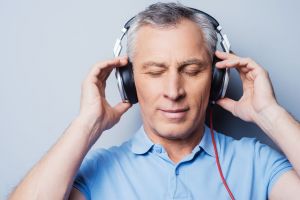|
www.HealthyHearing.com |
How to use headphones with hearing aids
Contributed by Debbie Clason, staff writer, Healthy Hearing, and Emily Ostrowski, content manager, Healthy Hearing Key points:
If you have hearing loss and want to listen to music or podcasts, is it better to stream the audio to your hearing aids via Bluetooth®, or use headphones instead? What about using both? There is no right or wrong answer: The choice is an individual one. Below, we provide tips for finding headphones and things to keep in mind for specific styles of hearing aids. Can you wear hearing aids and headphones?Yes, though getting good audio quality depends on the type of hearing aids you have, and the headphones. One drawback? Even if you have a good fit, hearing aids that are programmed to adapt to different listening environments may become "confused" if you are wearing headphones. What this means is that the hearing aid's processor might sense that you are in a different environment because your headphones are on, which could unnecessarily trigger a change in volume or activate noise suppression features. This means it's a good idea to test headphones out with your hearing aids before you buy them, or make sure your new headphones come with a good return policy. 
on-ear or over-the-ear headphones. In-the-ear hearing aids: Lots of choicesIf your hearing aids fit completely within the ear canal (with no external parts), then you can wear a wide range of headphones, whether they sit on the ear or over the ear. You might even be able to wear earbud-style headphones. Behind-the-ear (BTE) hearing aids: A bit trickierThese hearing aids have an external component that rests on the back of the ear. When using headphones with BTEs, choose a model that fits completely over the hearing aids’ microphone, which is located outside the ear canal and behind the ear. If it doesn’t fit completely over, the hearing aid will pick up external sound instead of what is coming from the headphone. You may have to try a few models to find the right fit. Some headphones may interfere with your hearing aids, especially if they don't fit well, notes Jon Marquis, a hearing instrument specialist (HIS) at Southern Maine Hearing. "In some cases, users may experience feedback (whistling) if the headphones create sound leakage," he said. Can you wear earbuds with hearing aids?Some people with completely in-the-canal hearing aids might be able to use earbuds and hearing aids at the same time. But for the most part, it's not recommended. Doing so can cause poor sound quality, feedback, and discomfort as the two devices will sit so closely together. For behind-the-ear hearing aid users, the earbud physically interferes with the tubing or receiver wire, making it especially hard to fit. What about AirPods?You may have heard the news that in September of 2024, Apple's AirPods Pro 2 headphones were FDA approved to act as an OTC hearing aid for adults with mild to moderate hearing loss. The new Apple AirPods Pro 3 are also equipped with hearing aid features. If you're wondering whether this would be a good option for you to both listen to music and improve your hearing ability, speak with a hearing provider and check out our full article on the pros and cons of using AirPods as hearing aids. Can using headphones hurt my hearing aids?Potentially. "Continuous pressure from headphone cups can misalign hearing aids, leading to discomfort or damage to the tubing and wiring," said Marquis. If you notice a change in your hearing aids' performance after using headphones, stop using the headphones and make an appointment with your hearing aid specialist to identify the issue. What about bone-conduction headphones?Bone-conduction headphones don't actually rest on the ear, but directly in front. People who wear in-the-ear hearing aids may especially like this option, as they don't block incoming sound, which is a nice safety feature. "While conventional earbuds and headphones may interfere with or jostle hearing aids, bone conduction headphones bypass this," explains Lily Katz of the website SoundGuys. However, if you have behind-the-ear headphones, you may still experience some discomfort as the headset may rub against the hearing aids (look for a pair of returnable hearing aids so you can test this out!). Headphones for single-sided deafnessWhen you have hearing loss in one ear, you lose out on the sensation of "surround sound," otherwise known as listening in stereo. Bone-conduction headphones can be a good option to get around this. Do I still need hearing aids while wearing headphones?Want to ditch the hearing aids altogether while you wear headphones? That may be an option for some users. Depending on how severe your hearing loss is, you may want to get special headphones known as amplified headphones, which can deliver signals more loudly than standard headphones. A separate headphone “equalizer” allows you to boost low, mid and high frequencies to suit yourself and your unique pattern of hearing loss. However, before making this choice, speak with your hearing care provider about whether or not this is a safe or wise option for you. Watch out for over-amplificationIf you do use headphones, make sure to do so at a safe volume. You want to protect your residual hearing. Listening to volumes higher than 85 dB can cause additional noise-induced hearing loss. "Hearing aids already amplify incoming sound," said Marquis. "Adding headphones can inadvertently stack amplification, potentially exposing users to dangerously high volume levels." He recommends keeping the headphone volume low to moderate, aiming for under 85 decibels. It's also important to take breaks when listening with headphones, especially if you are listening for more than an hour at one time. More: How to prevent hearing loss from headphones or earbuds Ask your hearing healthcare professionalIf you’re still having trouble finding headphones that work with your hearing aids, make sure you’re using the hearing aid program for the listening environment you're in (if you have that option available). If you’re in doubt about which program to use—or have additional questions about using headphones with your devices —ask your hearing healthcare professional for assistance. If you are currently in search of a provider, use our clinic directory to find a hearing specialist near you. Debbie Clason, staff writer, Healthy Hearing
Emily Ostrowski, content manager, Healthy Hearing
Related Help Pages:
Hearing aids Types of hearing aids Technology TV hearing aid and listening devices
|
Featured clinics near me
Earzlink Hearing Care - Reynoldsburg
7668 Slate Ridge Blvd
Reynoldsburg, OH 43068

Find a clinic
We have more hearing clinic reviews than any other site!


 Debbie Clason holds a master's degree from Indiana University. Her impressive client list includes financial institutions, real estate developers, physicians, pharmacists and nonprofit organizations.
Debbie Clason holds a master's degree from Indiana University. Her impressive client list includes financial institutions, real estate developers, physicians, pharmacists and nonprofit organizations.
 Emily is an experienced journalist and medical content writer based in Maine. Passionate about delivering enlightening and accurate content, she is committed to empowering people to make informed choices regarding their hearing health.
Emily is an experienced journalist and medical content writer based in Maine. Passionate about delivering enlightening and accurate content, she is committed to empowering people to make informed choices regarding their hearing health.